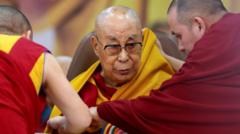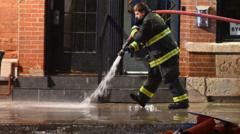**His reign signals potential shifts in church policy and highlights his background as he confronts global issues, including peace and social justice.**
**Pope Leo XIV: A Historic Selection of the First American Pontiff**

**Pope Leo XIV: A Historic Selection of the First American Pontiff**
**In a landmark moment for the Roman Catholic Church, Cardinal Robert Francis Prevost has been elected Pope Leo XIV, becoming the first pontiff from the United States.**
Robert Francis Prevost was elected the 267th pope of the Roman Catholic Church, taking on the name Leo XIV. This historic election marks the first time an American has ascended to the papacy, challenging long-held perceptions about the church’s leadership demographics. In an official greeting from the Vatican balcony, he emphasized the importance of peace for the church and the global community.
Born in Chicago, Prevost spent over two decades as a bishop in Peru, becoming a naturalized citizen of the country. His extensive experience in Latin America is expected to shape his papal priorities. During his initial speech, he highlighted a need for unity and social justice within the church, a theme reminiscent of his predecessor, Pope Francis, who passed away a month earlier.
Prior to his election, the conclave lasted more than 24 hours and involved multiple voting rounds among 133 cardinals, a record number. Despite the diversity of views among the electorate, Prevost emerged as a candidate who could bridge various ideological divides, appealing to both progressive and conservative factions.
Reactions to Pope Leo XIV's election spanned the globe, particularly resonating in Chicago and Peru, where fans celebrated his heritage. World leaders extended their congratulations, expressing hopes that the new pontiff would promote peace and justice on a global scale. Notably, President Trump called it a "great honor" for the United States.
While Leo XIV's stance on LGBTQ+ issues remains uncertain, early reactions from advocates for inclusivity expressed muted optimism, hoping he would uphold the inclusive spirit fostered by Pope Francis.
Pope Leo XIV’s ascension offers the promise of continuity in addressing social issues and a potential evolution in the church’s approach to modern challenges. His unique background and experiences in challenging environments suggest a nuanced understanding of the socioeconomic complexities that vulnerable populations face today.
The new pope received a warm welcome at Villanova University, where he studied, with many community members celebrating his election as a proud moment for the institution. Overall, the election marked a significant moment not just for American Catholics, but for the global church as it enters a new chapter under Pope Leo XIV.
Born in Chicago, Prevost spent over two decades as a bishop in Peru, becoming a naturalized citizen of the country. His extensive experience in Latin America is expected to shape his papal priorities. During his initial speech, he highlighted a need for unity and social justice within the church, a theme reminiscent of his predecessor, Pope Francis, who passed away a month earlier.
Prior to his election, the conclave lasted more than 24 hours and involved multiple voting rounds among 133 cardinals, a record number. Despite the diversity of views among the electorate, Prevost emerged as a candidate who could bridge various ideological divides, appealing to both progressive and conservative factions.
Reactions to Pope Leo XIV's election spanned the globe, particularly resonating in Chicago and Peru, where fans celebrated his heritage. World leaders extended their congratulations, expressing hopes that the new pontiff would promote peace and justice on a global scale. Notably, President Trump called it a "great honor" for the United States.
While Leo XIV's stance on LGBTQ+ issues remains uncertain, early reactions from advocates for inclusivity expressed muted optimism, hoping he would uphold the inclusive spirit fostered by Pope Francis.
Pope Leo XIV’s ascension offers the promise of continuity in addressing social issues and a potential evolution in the church’s approach to modern challenges. His unique background and experiences in challenging environments suggest a nuanced understanding of the socioeconomic complexities that vulnerable populations face today.
The new pope received a warm welcome at Villanova University, where he studied, with many community members celebrating his election as a proud moment for the institution. Overall, the election marked a significant moment not just for American Catholics, but for the global church as it enters a new chapter under Pope Leo XIV.




















